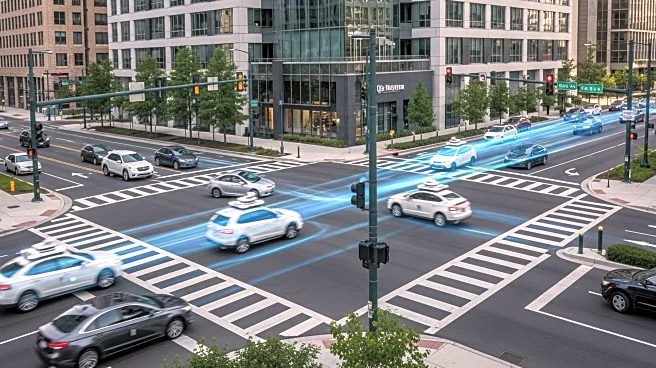What's Happening?
The rise of self-driving cars is set to transform transportation in US cities, potentially leading to increased congestion. Companies like Waymo, Tesla, and Zoox are expanding their autonomous vehicle (AV) services across cities such as Austin, Los Angeles, and Las Vegas, with plans to extend to Dallas, New York City, Philadelphia, and Miami. Ride-hail companies like Uber are also entering the market, deploying thousands of robotaxis. While AVs offer benefits such as eliminating drunk or distracted driving, their increased use could exacerbate traffic congestion and widen disparities between AV users and public transit riders. Cities must update their transportation policies to accommodate this shift and avoid repeating past mistakes made during the rise of automobiles.
Why It's Important?
The introduction of self-driving cars could significantly impact urban transportation systems, potentially increasing traffic congestion and air pollution. As AVs become more prevalent, cities may face challenges in managing increased vehicle numbers, including 'deadheading'—vehicles driving without passengers. This could worsen traffic jams and slow public transit. Implementing congestion pricing and mileage-based fees could mitigate these issues, encouraging efficient use of road space. The shift to AVs also presents opportunities to repurpose parking spaces for housing or green spaces, enhancing urban environments. Cities must act proactively to ensure AVs contribute positively to urban life.
What's Next?
Cities need to develop policies to manage the impact of AVs, such as congestion pricing and dynamic parking fees. Creating digital maps of curbs and automating enforcement of traffic laws could help manage AV deployment. Municipal leaders should consider reforms to reduce parking requirements and charge market rates for parking. These measures can improve current urban conditions and prepare cities for a future with widespread AV use. State legislatures may need to relax restrictions on automatic enforcement to support these efforts.
Beyond the Headlines
The rise of AVs could lead to long-term changes in urban planning and transportation policy. Reducing parking spaces and implementing dynamic pricing could transform city landscapes, promoting more sustainable and efficient transportation modes. Ethical considerations around privacy and data collection by AV companies may also arise, requiring careful regulation. The shift to AVs could influence cultural attitudes towards car ownership and urban mobility, potentially leading to a more shared and connected transportation system.









